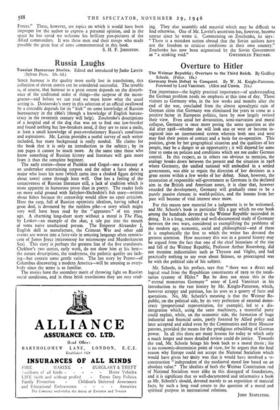Russia Laughs
Russian Humorous Stories. Edited and introduced by Janko Lavrin (Sylvan Press. 10s. 6d.) SINCE humour is the quality most easily lost in translations, this collection of eleven stories can be considered successful. The trouble is, of course, that humour to a great extent depends on the disturb- ance of the traditional order of things—the surprise of the incon- gruous—and before we can read we must know what the usual setting is. Dostoevsky's story in this selection of an official swallowed by a crocodile depends for its " kick " on some knowledge of Russian bureaucracy in the 186o's (though a knowledge of English bureau- cracy in the twentieth century will help). Zoschenko's descriptions of a hospital and of the dog that was set to find one law-breaker and found nothing but law-breakers need, if they are to raise a smile, at least a small knowledge of post-revolutionary Russia's conditions and aspirations. Mr. Lavrin provides a useful survey of each writer included, but more background is really needed. He claims for the book that it is only an introduction to the subject ; by its 200 pages it cannot be much more. At the same time those who know something of Russian history and literature will gain more from it than the complete beginner.
The early stories—those of Pushkin and Gogol—one a fantasy of an undertaker entertaining corpses and the other a farce about a major who loses his nose (which turns into a cloaked figure driving about town) come through least well. One has a feeling of the tentativeness of Russian literature still, a lack of tradition which is more apparent in humorous prose than in poetry. The reader feels on more solid ground with Saltykov-Shchedrin's fish story—written about fishes because the censorship would allow no open criticism. Here the carp, full of Russian optimistic idealism, having talked a great deal, is devoured by the ruthless pike—a story which might very well have been read by the " appeasers " of ten years ago. A charming long-short story without a moral is The Flea, by Leskov—an example of the skaz, a tale put into the mouth of some naive uneducated person. The Emperor Alexander I, English skill in manufacture, the Crimean War and other odd events are woven into a fairy-tale in amusing language often reminis- cent of James Joyce (microsnoop for microscope and Murderitanean Sea). This story is perhaps the greatest feat of the five translators. Chekhov's two stories, early work, do not show him at his best— the nature descriptions, the tenderness, the pathetic quality are lack- ing—but contain some gentle satire. The last story by Petrov—of Columbus discovering a modern America—will be amusing to every- body since the scene is so familiar.
The stories have the secondary merit of throwing light on Russian social conditions, and in these brisk translations they are easy read- ing. They also assemble odd material which may be difficult to find otherwise. One of Mr. Lavrin's assertions has, however, become untrue since he wrote it. Commenting on Zoschenko, he says : " There is a mistaken notion abroad that the Soviet authors have not the freedom to criticise conditions in their own country." Zoschenko has now been stigmatised by the Soviet Government


































 Previous page
Previous page